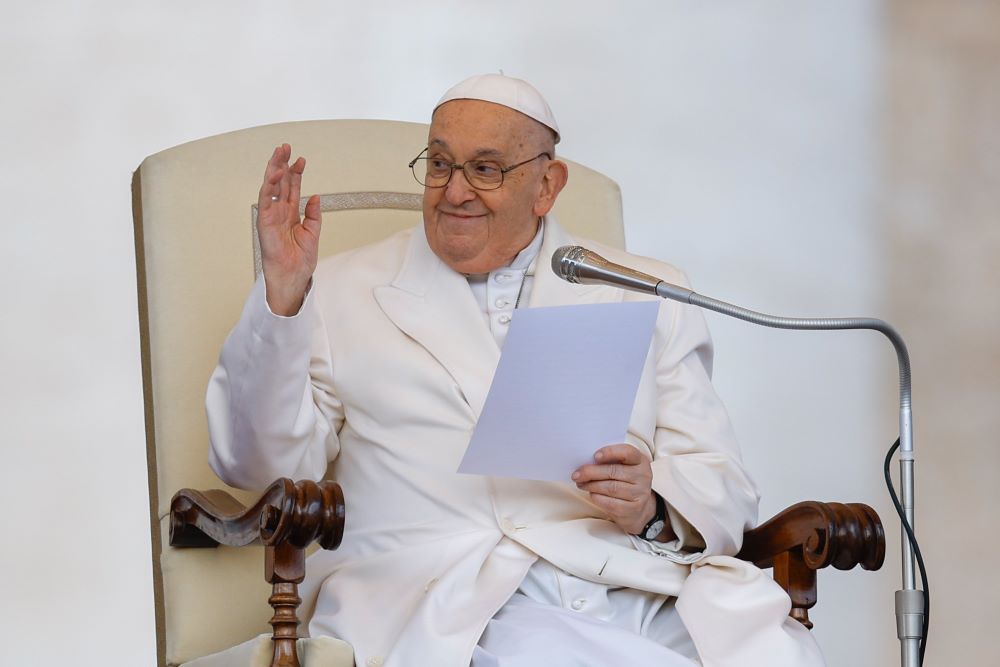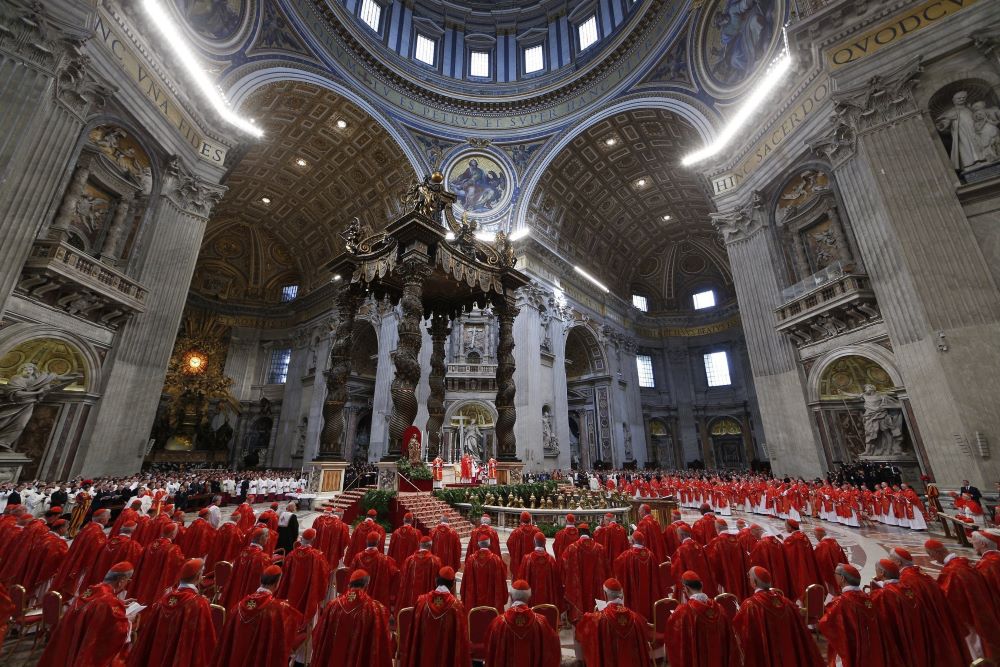
Pope Francis greets visitors while he makes brief remarks at the end of his weekly general audience in St. Peter's Square at the Vatican on March 6. Francis had an aide read his main text because of persisting cold symptoms, (CNS/Lola Gomez)
What are we to make of "The Vatican Tomorrow" or "Demos II" as it is being called, the anonymous musings about the current pontificate and what issues should determine the selection of the next pope? It claims to draw inspiration from the anonymous letter entitled "The Vatican Today" published in March 2022 and subsequently (and posthumously) attributed to the pen of the late Cardinal George Pell. This text, too, claims to be the work of a cardinal.
The complaints are familiar. After acknowledging Pope Francis' strengths, it lists the "shortcomings" of the current pontificate: "an autocratic, at times seemingly vindictive, style of governance; a carelessness in matters of law; an intolerance for even respectful disagreement; and — most seriously — a pattern of ambiguity in matters of faith and morals causing confusion among the faithful." The text continues: "Confusion breeds division and conflict. It undermines confidence in the Word of God. It weakens evangelical witness. And the result today is a Church more fractured than at any time in her recent history."
"Confusion." Way back in 2014, Archbishop Charles Chaput complained about the synod on the family at an event sponsored by First Things. He said, "I was very disturbed by what happened. I think confusion is of the devil, and I think the public image that came across was one of confusion." Now, we know that Chaput did not author the current treatise because it claims to have been written by a cardinal, and Chaput is the first archbishop of Philadelphia in a century who was never made a cardinal.
Complaining about ambiguity, and proposing that the church essentially ignore it, is like complaining about the wind. The complaint doesn't make the wind die down.
It should surprise no one that Chaput's longtime amanuensis, Francis Maier, has a fawning article about "The Vatican Tomorrow" at First Things. George Weigel joined Maier for a discussion of Maier's new book, True Confessions, at the Ethics and Public Policy Center. That conversation was, ahem, interesting.
The "Vatican Tomorrow" text goes on to explain that the next pope needs to return to basics, such as: "no one is saved except through, and only through, Jesus Christ, as he himself made clear;" and "man is God's creature, not a self-invention, a creature not merely of emotion and appetites but also of intellect, free will, and an eternal destiny," and "God's Word, recorded in Scripture, is reliable and has permanent force." Is there any doubt that Pope Francis holds all these truths of our faith? It is how one holds them that is the issue and the raison d'etre for theology.
A doctrinal claim such as "no one is saved except through, and only through, Jesus Christ, as he himself made clear" is not self-explanatory. In St. Paul's letter to the Colossians, 1:16, we read, "For in him all things were created, in heaven and on earth, visible and invisible, whether thrones or dominions or principalities or authorities — all things were created through him and for him." How does this text bear on the doctrinal claim? What of the people "created in him" who have never explicitly heard his name? Are they damned forever? That is not what the church teaches.
The supposed cardinal goes on to list "practical observations [that] flow from the task and list above." Top of the practical observations is this: "Real authority is damaged by authoritarian means in its exercise. The Pope is a Successor of Peter and the guarantor of Church unity. But he is not an autocrat. He cannot change Church doctrine, and he must not invent or alter the Church's discipline arbitrarily" (emphasis in original). Where is there evidence of this autocratic behavior? Where has Francis attempted to change church doctrine?
The complaint continues: "A new Pope must restore the hermeneutic of continuity in Catholic life and reassert Vatican II's understanding of the papacy's proper role." How does one "restore" what was never there? How many times must it be pointed out that Pope Benedict XVI, in his famous 2005 address to the curia, did not, repeat did not, call for a "hermeneutic of continuity." Yes, he specifically spoke against a "hermeneutic of discontinuity" but Benedict proposed, instead, a hermeneutic of reform, saying: "It is precisely in this combination of continuity and discontinuity at different levels that the very nature of true reform consists."

In this file photo, before entering the conclave, cardinals concelebrate Mass for the election of the Roman pontiff in St. Peter's Basilica at the Vatican on March 12, 2013. (OSV News/CNS/Paul Haring)
Demos II continues the assault on Francis:
Third: Ambiguity is neither evangelical nor welcoming. Rather, it breeds doubt and feeds schismatic impulses. The Church is a community not just of Word and sacrament, but also of creed. What we believe helps to define and sustain us. Thus, doctrinal issues are not burdens imposed by unfeeling "doctors of the law." Nor are they cerebral sideshows to the Christian life. On the contrary, they're vital to living a Christian life authentically, because they deal with applications of the truth, and the truth demands clarity, not ambivalent nuance.
Has the author ever spoken to a young person today? Ambiguity is a reality of life in modern, pluralistic societies. In fact, it was probably more of a reality in previous times and less pluralistic cultures too, it was just hidden from view or has been lost to history. Complaining about ambiguity, and proposing that the church essentially ignore it, is like complaining about the wind. The complaint doesn't make the wind die down.
My favorite "practical observation" is item 5:
Fifth: The Church, as John XXIII so beautifully described her, is mater et magistra, the "mother and teacher" of humanity, not its dutiful follower; the defender of man as the subject of history, not its object. She is the bride of Christ; her nature is personal, supernatural, and intimate, not merely institutional. She can never be reduced to a system of flexible ethics or sociological analysis and remodeling to fit the instincts and appetites (and sexual confusions) of an age.
Ah, yes, Mater et magistra, Pope John XXIII's compelling social encyclical that also produced the first time a prominent American layman publicly dissented from papal teaching! William Buckley famously responded with a vigorous defense of American capitalism entitled, "Mater — Si!; Magistra — No!" It is always good to note the existence of cafeteria Catholicism on the right has a pedigree too.
Setting aside that happily coincidental historical footnote, when does Francis say he wishes to "reduce" the Catholic Church to "a system of flexible ethics?" When does he deploy "sociological analysis" in place of the Gospel? Where has the pope indicated he wants the church's teaching "to fit the instincts and appetites (and sexual confusions) of an age?"
What the pope did say, and say powerfully, in the text that is the bugbear of the culture warrior Catholics, Amoris Laetitia, is this: "At times we find it hard to make room for God's unconditional love in our pastoral activity. We put so many conditions on mercy that we empty it of its concrete meaning and real significance. That is the worst way of watering down the Gospel."
Advertisement
Let this anonymous author, whether he be a cardinal or not, respond to that very clear statement of the Holy Father's. Does he really not see how Francis is very clear and spot-on in that observation?
The text concludes with a shameful admission: "Readers will quite reasonably ask why this text is anonymous. The answer should be evident from the tenor of today's Roman environment: Candor is not welcome, and its consequences can be unpleasant." Unpleasant? Does he mean his brother cardinals might hold him accountable for his insinuations? Cardinals wear red as a sign of their willingness to shed their own blood for the faith, but this man is unwilling to risk a little unpleasantness? For such great matters as the integrity of the faith?
We may never know who penned this attack on Francis. But we know one thing assuredly: The author is a coward, one who confuses easily.








